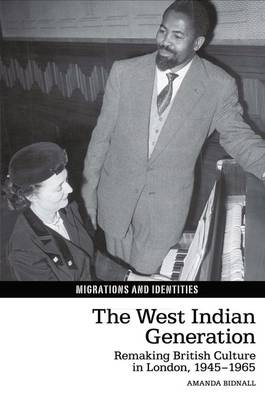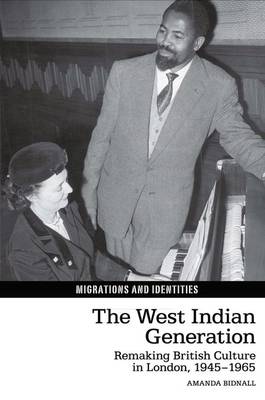
- Afhalen na 1 uur in een winkel met voorraad
- Gratis thuislevering in België vanaf € 30
- Ruim aanbod met 7 miljoen producten
- Afhalen na 1 uur in een winkel met voorraad
- Gratis thuislevering in België vanaf € 30
- Ruim aanbod met 7 miljoen producten
Omschrijving
Between Britain's imperial victory in the Second World War and its introduction of race-based immigration restriction 'at home, ' London's relationship with its burgeoning West Indian settler community was a cauldron of apprehension, optimism, ignorance, and curiosity.
The West Indian Generation: Remaking British Culture in London, 1945-1965 revisits this not-quite-postcolonial moment through the careers of a unique generation of West Indian artists that included actors Earl Cameron, Edric Connor, Pearl Connor, Cy Grant, Ronald Moody, Barry and Lloyd Reckord, and calypso greats Lord Beginner and Lord Kitchener. Colonial subjects turned British citizens, they tested the parameters of cultural belonging through their work.
Drawing upon familiar and neglected artifacts from London's cultural archives, Amanda Bidnall sketches the feathery roots of this community as it was both nurtured and inhibited by metropolitan institutions and producers hoping variously to promote imperial solidarity, educate mainstream audiences, and sensationalize racial conflict. Upon a shared foundation of language, education, and middle-class values, a fascinating collaboration took place between popular West Indian artists and cultural authorities like the Royal Court Theatre, the Rank Organisation, and the BBC. By analyzing the potential--and limits--of this collaboration, Bidnall demonstrates the mainstream influence and perceptive politics of pioneering West Indian artists. Their ambivalent and complicated reception by the British government, media, and populace draws a tangled picture of postwar national belonging. The West Indian Generation is necessary reading for anyone interested in the cultural ramifications of the end of empire, New Commonwealth migration, and the production of Black Britain.
Specificaties
Betrokkenen
- Auteur(s):
- Uitgeverij:
Inhoud
- Aantal bladzijden:
- 296
- Taal:
- Engels
- Reeks:
- Reeksnummer:
- nr. 7
Eigenschappen
- Productcode (EAN):
- 9781800348684
- Verschijningsdatum:
- 1/03/2021
- Uitvoering:
- Paperback
- Formaat:
- Trade paperback (VS)
- Afmetingen:
- 156 mm x 234 mm
- Gewicht:
- 417 g

Alleen bij Standaard Boekhandel
Beoordelingen
We publiceren alleen reviews die voldoen aan de voorwaarden voor reviews. Bekijk onze voorwaarden voor reviews.









